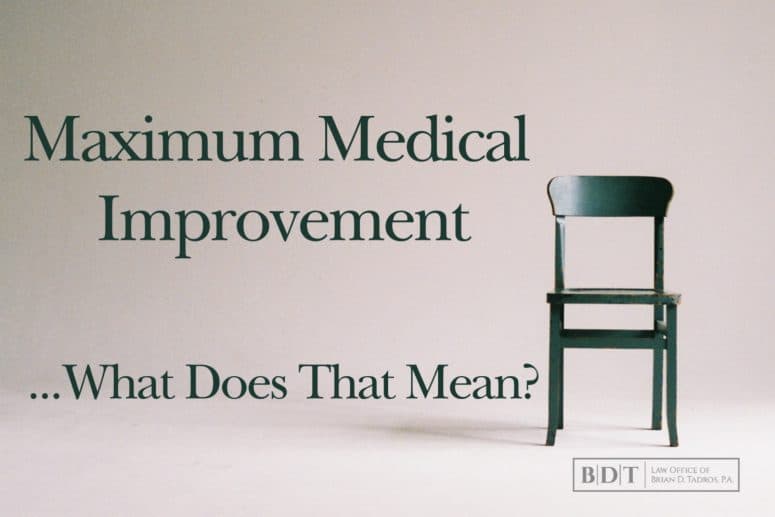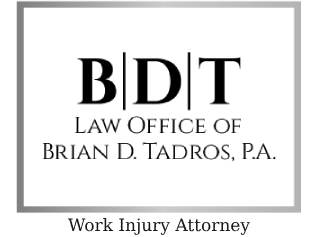
You’ve reached Maximum Medical Improvement…but what does that mean?
Here’s an explanation of what MMI in workers comp means for your case.
You’ve probably heard your doctor talk about Maximum Medical Improvement or MMI in your workers comp case. And like so much in your case, you might have been completely lost as to what this term means.
MMI is an important factor in understanding work related injuries and their effects. In this article, we’ll answer the following questions:
- What is MMI?
- What happens after I reach Maximum Medical Improvement?
- Can my condition change later?
- Should I settle my case?
- What rights am I entitled to?
As always, if you have questions regarding your specific case, contact an attorney.
Injured at Work In Florida?
WHAT IS MMI?
MMI stands for Maximum Medical Improvement.
Reaching MMI does NOT mean you’re in a state of maximum health and wellness. Rather, Florida Statutes define MMI as the point “after which further recovery from, or lasting improvement to, an injury or disease can no longer reasonably be anticipated, based upon reasonable medical probability.”
MMI in workers comp simply means that your authorized treating physician believes you’ve completed as much of the healing process as can be expected. In other words, your medical condition has stabilized, and is as good as it’s ever going to get. For some cases, this might mean the patient has fully recovered. Others might be left with a severe permanent disability.

Once your doctor has determined that you have reached MMI, s/he will give you a Permanent Impairment Rating (PIR).
Your PIR is not subject to the doctor’s opinion or how good of a mood they are in that day. In order to determine this rating, they must match their patient’s medical condition against the distinct guidelines set out in The 1996 Florida Uniform Permanent Impairment Rating Schedule.
In simple terms, however, your Permanent Impairment Rating is expressed as a percentage of the amount of your body (as a whole) that is permanently injured. For example, if 10% of your body has been permanently injured, you will receive a PIR rating of 10%. For any PIR over 0%, you will be entitled to a specific number of weeks of impairment income benefits, or IIBs (more on this later).
At the point you reach Maximum Medical Improvement, your doctor will also indicate whether you require any permanent work restrictions and, if so, what they are.
If you are found to be unable to return to work of any kind (which is rare), you may qualify for Permanent Total Disability benefits, which will be the same amount as your Temporary Total Disability benefits and last until you are 75 years of age or—if the accident occurred after age 70—for no more than five years.
Again, it is very rare for you to qualify for PTD benefits.
If you have a permanent impairment, it is more likely that you would qualify for Impairment Income Benefits. If you truly are unable to perform even a sit-down job within 50 miles of where you live, you very well could qualify for PTD benefits.

WHO DECIDES WHETHER I HAVE REACHED MMI?
Usually, it is your authorized treating physician who will make this call. However, it is in your insurance company’s best interest for you to fully recover and reach MMI as soon as possible.
One time over the life of your claim, the workers comp insurance company can have you undergo an independent medical examination (IME) with a physician of their choice who is not already providing you with treatment. This IME physician will review your medical history and may even come to the conclusion that you have already reached MMI (regardless of what your authorized treating physician says).
If this happens to you, I would strongly advise you to seek assistance from a licensed workers compensation attorney who can inform you of your rights.
WHAT HAPPENS AFTER YOU REACH MAXIMUM MEDICAL IMPROVEMENT?
So you’ve reached MMI—meaning you’ve gotten your Permanent Impairment Rating—now what?
The first thing to mention is that your temporary partial benefits or temporary total benefits (i.e. the workers compensation benefits designed to replace your lost wages) will end. In their place, you will collect impairment income benefits, or IIBs.
Both the amount you receive and the length of time you receive them will depend on your unique circumstances, such as your PIR, your Average Weekly Wage, and whether you are able to return to work or not.
If you know your PIR rating, you can use Florida’s Chief Financial Officer’s Impairment Income Benefits Calculator to find out what you are entitled to.

Some people prefer to wait until they have reached MMI to settle their workers comp claim. However, this may result in a lower settlement, as settlement is based on what your case will cost the insurance company if it doesn’t settle.
You see, if the insurance company has already paid for surgery, post-operative physical therapy, routine treatment, and temporary indemnity benefits, and you then try to settle your case, the value would be less than before the insurance company pays for all of those things.
If you are not yet at MMI and the insurance company anticipates continuing to pay Temporary Total Disability or Temporary Partial Disability benefits to you, your case is likely going to cost the insurance company more than it would have if you had reached MMI and they could stop payments.
In short, the more the insurance company expects to pay in your case, the higher value it has from a settlement standpoint.
Even after reaching MMI, you should follow up regularly (we recommend at least every 6 months) with your authorized treating physician to discuss any questions/concerns you have, obtain refills on medication, and monitor your condition. This will help keep your condition in check and will also permit you to receive medical benefits on an ongoing basis.
It should be noted that failure to regularly receive medical treatment can result in the statute of limitations running out on your claim.
Should I Settle My Case?
The decision of whether to settle workers compensation claims (or even accept the first settlement offer) is a delicate matter, and one that you should discuss with your workers compensation attorney.
However, there are some important factors you need to consider while making that decision.
How does MMI factor in when exploring settlement? Remember, all MMI means is that you are not anticipated to get any better…it doesn’t mean that you won’t get worse or that you won’t need a significant amount of medical treatment for the remainder of your life to maintain your current physical and functional ability.
Those IIB payments are limited—both in terms of the amount and the length of time you will receive them—but they are all the insurance company is legally obligated to pay you after you reach MMI.
This means that, even if you are so physically impaired that you can no longer perform your specialized $40/hour job and can now earn only minimum wage, the insurance company does not have to compensate you for your loss of earning potential.
A settlement may be the only possible way of receiving some form of financial compensation commensurate with your long-term needs. This is why you should never let worry or fear intimidate you into accepting the insurance company’s first offer.
It’s crucial that you consult with both your doctor and your attorney before accepting any settlement offer. Together, they will be able to help give you a better idea of the financial consequences of your injury.
What Else Am I Entitled To?
Although Maximum Medical Improvement prevents you from collecting lost wage benefits, you are still entitled to some rights as a result of your workplace injury.
For starters, you have the right to vocational rehab to learn a new trade if you are no longer able to perform your old one. For an injured employee who has experienced a significant loss of their earning potential, this can be incredibly rewarding.
You also have the right to continued medical treatment. As long as your accident was greater than 50% of the cause of your injury (in other words, as long as your injury qualifies for workers comp) and continues to be, you are entitled to medical care for as long as your condition lasts.
Lastly—and most importantly—you have the right to legal representation. Although the workers compensation program is designed to work without an attorney, sometimes you need some extra help asserting your rights and getting the full amount of benefits you are entitled to.
What To Do Next
If you have reached MMI in a workers comp case, your lost wages benefits will be coming to an end, but that doesn’t mean that your workplace injury woes are over. You still have a lifetime of palliative medical care ahead of you that—when combined with any loss of earning potential—could have devastating financial consequences.
Studies have shown that, after reaching MMI, workers comp lawyers not only increase your settlement amount, but drastically reduce the length of your case. (Curious about workers’ comp lawyer fees? Here’s how they work.)
At the Law Office of Brian D. Tadros, P.A. our goal is to do what’s best for you. We will never force you into a decision that is not the best solution for you and we pride ourselves on our ability to educate and guide our clients through a very difficult time.
Interested in learning more? Schedule a free case evaluation to see how we can help you.



